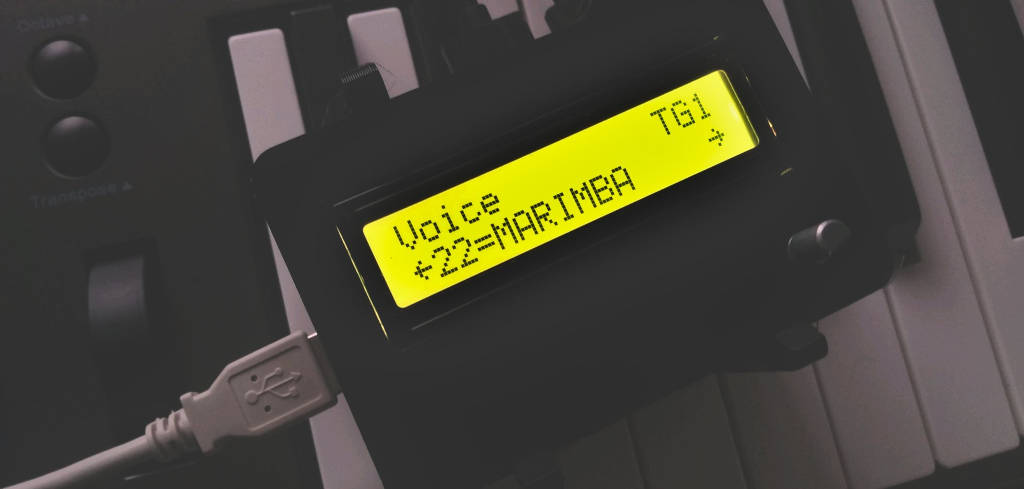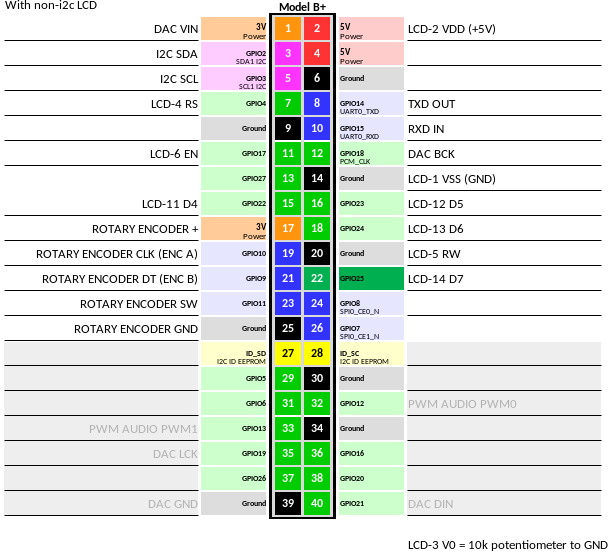mirror of https://github.com/probonopd/MiniDexed
You can not select more than 25 topics
Topics must start with a letter or number, can include dashes ('-') and can be up to 35 characters long.
122 lines
9.1 KiB
122 lines
9.1 KiB
# MaxiDexed 
|
|
|
|
This project aims at increasing the marvelous job done with MiniDexed focusing on the user interface as I believe that FM synthesis is difficult enough to deserve a simple but more confortable user interface to replace the 2x16 chars displays and the one button with click, double clicks and triple clicks! As you guessed it, I want to make it autonomous from computer assistance.
|
|
|
|
I added at the tip of the feature list the few features I would like to contribute in this fork.
|
|
|
|
For the moment this fork will concentrate on Raspberry PI 4B and potentialy above. I do not intent to test the code on any other lower versions.
|
|
|
|

|
|
|
|
MiniDexed is a FM synthesizer closely modeled on the famous DX7 by a well-known Japanese manufacturer running on a bare metal Raspberry Pi (without a Linux kernel or operating system). On Raspberry Pi 2 and larger, it can run 8 tone generators, not unlike the TX816/TX802 (8 DX7 instances without the keyboard in one box). [Featured by HACKADAY](https://hackaday.com/2022/04/19/bare-metal-gives-this-pi-some-classic-synths/) and [adafruit](https://blog.adafruit.com/2022/04/25/free-yamaha-dx7-synth-emulator-on-a-raspberry-pi/).
|
|
|
|
## Features
|
|
|
|
### Maxi Dexed features backlog
|
|
- [ ] DEV01 - Change build structure so that object and other bin files go away from the sources directories
|
|
- [x] PRESET01 - Preset browsing: changing bak automaticallw when reaching the left or right preset boundary so that:
|
|
```
|
|
- Bank 1 Preset 1 + 1 -> Bank 1 Preset 2
|
|
- Bank 1 Preset 1 - 1 -> Bank 1 Preset 1
|
|
- Bank n Preset 32 + 1 -> Bank n+1 Preset 1
|
|
- Bank n Preset 1 - 1 -> Bank n-1 Preset 32
|
|
```
|
|
- [x] PRESET02 - Support more than 127 banks adding the support MIDI CC0 [Bank Select (MSB)] et MIDI CC32 [Bank Select (LSB)] to allow a maximum of 2^14 = 16384 so that:
|
|
```
|
|
- Bank ID bin: nn nnnn nnnn nnnn
|
|
- MIDI CC 0: nn nnnn nxxx xxxx
|
|
- MIDI CC 32: xx xxxx xnnn nnnn
|
|
```
|
|
- [x] PRESET03 - Add bank sysex material to complement the current one
|
|
- [ ] PRESET04 - Add performance support and edit to leverage the 8 Tone Generators
|
|
- [ ] SYNTH01 - Add Delay FX
|
|
- [ ] SYNTH02 - Add Chorus FX
|
|
- [ ] SYNTH03 - Add Flanger FX
|
|
- [ ] SYNTH04 - Add Distortion FX
|
|
- [-] HW01 - Create a 3D printable enclosure for the synth that uses the Raspaudio option
|
|
- [ ] HW02 - Add support for I2C screen interface (4pins)
|
|
- [ ] HW03 - Build PCB to ease the inclusion of all encoders, the screen and the audio sound card and include passive heat dissipation (OOTS Raspberry PI heatsink such as [GeeekPi Raspberry Pi 4](https://www.amazon.fr/gp/product/B07WQT1RRZ/ref=sw_img_1?smid=A187Y4UVM6ZA0X&th=1))
|
|
- [ ] HW04 - Design a metal enclosure with real size inputs and outputs
|
|
### MiniDexed feature backlog
|
|
- [x] Uses [Synth_Dexed](https://codeberg.org/dcoredump/Synth_Dexed) with [circle-stdlib](https://github.com/smuehlst/circle-stdlib)
|
|
- [x] SD card contents can be downloaded from [GitHub Releases](../../releases)
|
|
- [x] Runs on all Raspberry Pi models (except Pico); see below for details
|
|
- [x] Produces sound on the headphone jack, HDMI display or [audio extractor](https://github.com/probonopd/MiniDexed/wiki/Hardware#hdmi-to-audio) (better), or a [dedicated DAC](https://github.com/probonopd/MiniDexed/wiki/Hardware#i2c-dac) (best)
|
|
- [x] Supports multiple voices through Program Change and Bank Change LSB/MSB MIDI messages
|
|
- [x] Loads voices from `.syx` files from SD card (e.g., using `getsysex.sh` or from [Dexed_cart_1.0.zip](http://hsjp.eu/downloads/Dexed/Dexed_cart_1.0.zip))
|
|
- [x] Menu structure on optional [HD44780 display](https://www.berrybase.de/sensoren-module/displays/alphanumerische-displays/alphanumerisches-lcd-16x2-gr-252-n/gelb) and rotary encoder
|
|
- [x] Runs up to 8 Dexed instances simultaneously (like in a TX816) and mixes their output together
|
|
- [x] Allows for each Dexed instance to be detuned and stereo shifted
|
|
- [x] Allows to configure multiple Dexed instances through `performance.ini` files
|
|
- [x] Compressor effect
|
|
- [x] Reverb effect
|
|
- [x] Voices can be edited over MIDI, e.g., using the [synthmata](https://synthmata.github.io/volca-fm/) online editor (requires [additional hardware](https://github.com/probonopd/MiniDexed/wiki/Hardware#usb-midi-device))
|
|
|
|
## Introduction
|
|
|
|
Video about this project by [Floyd Steinberg](https://www.youtube.com/watch?v=Z3t94ceMHJo):
|
|
|
|
[](https://www.youtube.com/watch?v=Z3t94ceMHJo)
|
|
|
|
## System Requirements
|
|
|
|
* Raspberry Pi 1, 2, 3, 4, or 400 (Zero and Zero 2 can be used but need HDMI or a supported i2s DAC for audio out). On Raspberry Pi 1 and on Raspberry Pi Zero there will be severely limited functionality (only one tone generator instead of 8)
|
|
* A [PCM5102A or PCM5122 based DAC](https://github.com/probonopd/MiniDexed/wiki/Hardware#i2c-dac), HDMI display or [audio extractor](https://github.com/probonopd/MiniDexed/wiki/Hardware#hdmi-to-audio) for good sound quality. If you don't have this, you can use the headphone jack on the Raspberry Pi but on anything but the Raspberry 4 the sound quality will be seriously limited
|
|
* Optionally (but highly recommended), an [LCDC1602 Display](https://www.berrybase.de/en/sensors-modules/displays/alphanumeric-displays/alphanumerisches-lcd-16x2-gr-252-n/gelb) (with or without i2c "backpack" board) and a [KY-040 rotary encoder](https://www.berrybase.de/en/components/passive-components/potentiometer/rotary-encoder/drehregler/rotary-encoder-mit-breakoutboard-ohne-gewinde-und-mutter)
|
|
|
|
## Usage
|
|
|
|
* In the case of Raspberry Pi 4, Update the firmware and bootloader to the latest version (not doing this may cause USB reliability issues)
|
|
* Download from [GitHub Releases](../../releases)
|
|
* Unzip
|
|
* Put the files into the root directory of a FAT32 formatted partition on SD/microSD card (Note for small SD cards which are no longer sold: If less than 65525 clusters, you may need to format as FAT16.)
|
|
* Put SD/microSD card into Raspberry Pi 1, 2, 3 or 4, or 400 (Zero and Zero 2 can be used but need HDMI or a supported i2c DAC for audio out)
|
|
* Attach headphones to the headphone jack using `SoundDevice=pwm` in `minidexed.ini` (default) (poor audio quality)
|
|
* Alternatively, attach a PCM5102A or PCM5122 based DAC and select i2c sound output using `SoundDevice=i2s` in `minidexed.ini` (best audio quality)
|
|
* Alternatively, attach a HDMI display with sound and select HDMI sound output using `SoundDevice=hdmi` in `minidexed.ini` (this may introduce slight latency)
|
|
* Attach a MIDI keyboard via USB (alternatively you can build a circuit that allows you to attach a "traditional" MIDI keyboard using a DIN connector, or use a DIN-MIDI-to-USB adapter)
|
|
* If you are using a LCDC1602 with an i2c "backpack" board, then you need to set `LCDI2CAddress=0x27` (or another address your i2c "backpack" board is set to) in `minidexed.ini`
|
|
* Boot
|
|
* Start playing
|
|
* If the system seems to become unresponsive after a few seconds, remove `usbspeed=full` from `cmdline.txt` and repeat ([details](https://github.com/probonopd/MiniDexed/issues/39))
|
|
* Optionally, put voices in `.syx` files onto the SD card (e.g., using `getsysex.sh`)
|
|
* See the Wiki for [Menu](https://github.com/probonopd/MiniDexed/wiki/Menu) operation
|
|
* If something is unclear or does not work, don't hesitate to [ask](https://github.com/probonopd/MiniDexed/discussions/)!
|
|
|
|
## Pinout
|
|
|
|
All devices on Raspberry Pi GPIOs are **optional**.
|
|
|
|

|
|
|
|
Please the the [wiki](https://github.com/probonopd/MiniDexed/wiki) for more information.
|
|
|
|
## Downloading
|
|
|
|
Compiled versions are available on [GitHub Releases](../../releases). Just download and put on a FAT32 formatted SD card.
|
|
|
|
## Building
|
|
|
|
Please see the [wiki](https://github.com/probonopd/MiniDexed/wiki/Development#building-locally) on how to compile the code yourself.
|
|
|
|
## Contributing
|
|
|
|
This project lives from the contributions of skilled C++ developers, testers, writers, etc. Please see https://github.com/probonopd/MiniDexed/issues.
|
|
|
|
## Discussions
|
|
|
|
We are happy to hear from you. Please join the discussions on https://github.com/probonopd/MiniDexed/discussions.
|
|
|
|
## Documentation
|
|
|
|
Project documentation is at https://github.com/probonopd/MiniDexed/wiki.
|
|
|
|
## Acknowledgements
|
|
|
|
This project stands on the shoulders of giants. Special thanks to:
|
|
|
|
* [raphlinus](https://github.com/raphlinus) for the [MSFA](https://github.com/google/music-synthesizer-for-android) sound engine
|
|
* [asb2m10](https://github.com/asb2m10/dexed) for the [Dexed](https://github.com/asb2m10/dexed) software
|
|
* [dcoredump](https://github.com/dcoredump) for https://codeberg.org/dcoredump/Synth_Dexed, a port of Dexed for embedded systems
|
|
* [rsta2](https://github.com/rsta2) for https://github.com/rsta2/circle, the library to run code on bare metal Raspberry Pi (without a Linux kernel or operating system) and for the bulk of the MiniDexed code
|
|
* [smuehlst](https://github.com/smuehlst) for https://github.com/smuehlst/circle-stdlib, a version with Standard C and C++ library support
|
|
|